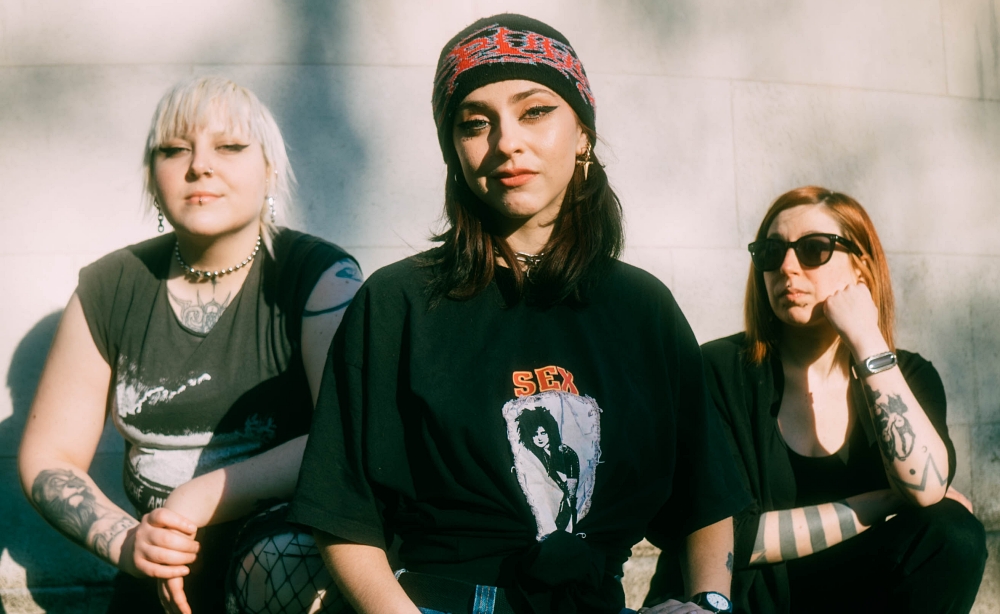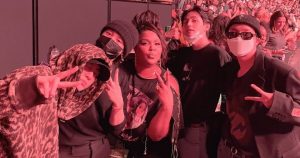‘WE ARE QUEER, and we’re gonna live!’ roars Shooting Daggers’ singer Sal Salgado Pellegrin, on We Will Live, the penultimate call-to-arms on the band’s fearless new EP, Athames.
It’s a lyric that sums up the steely eyed attitude behind the band’s brutal, yet triumphant, hardcore punk. Heavy music is a place where people can find a home, when they feel they don’t belong anywhere else. But for a community that prides itself on inclusivity, metal and hardcore can still be unwelcoming spaces for women, the LGBTQ+ community and people of colour.
It’s those intolerances that the trio – made up of French vocalist and guitarist Sal, Italian bassist Bea Simion and Spanish drummer Raquel J Alves – are determined to eradicate. Inspired by the riot grrrl movement, G.L.O.S.S and Black Flag, alongside queercore peers Sharptooth and Pupil Slicer, they’re fiercely and noisily taking their own space in metal’s traditionally white, cishet male scene.
“We’re vegan, we’re feminist, we’re women, we’re queer, we’re political, so we’ve got a lot to say,” says Sal. “Our music shares our perspective on our place in the scene, and in the world. I feel like you still have to prove you’re worth something and you’re not a poser when you’re a woman in the scene.”
“Sometimes people come to us, and they say, ‘When I saw you going onstage, I didn’t expect you to be that hardcore, that heavy,’” adds Bea, arching an eyebrow. “And I’m always like, ‘Why wouldn’t you expect us to be heavy?’”
Sal and Bea formed the band in London in 2019, releasing their debut demo EP that October with a different drummer. After a line-up change, Raquel, a long-time London resident and band booker on the local scene, joined the ranks in November.
“I’ve noticed people are more open to booking different bands,” says Raquel of the progression she’s noted since she started working at shows 15 years ago. “At least you have some representation on the stage. It’s changing, really slowly, but now there are a lot of bands speaking up with their views. When I was younger, you wouldn’t see a black metal band that was anti-fascist, or a queer doom band like Vile Creature.”
“But even though hardcore is a safe space for us, there is still a lot of work to do,” Bea cuts in. “It’s still very white. It’s still very misogynistic. A lot of girl and queer bands still don’t have a space. You still need to have male respect: when men respect and like you, that’s when other people like you too. Men for sure still own the scene and they decide who is cool and who is not.”
With the new line-up secured, the band headed into Crow’s Nest Studios in Croydon during lockdown, to record their new EP, Athames. Its seven tracks burn with disgust, fury and injustice. “[Opener] No Exit is about the high standards of beauty that kill women mentally,” says Sal. “If you don’t reach the standards, you don’t exist.”
“If you’re pretty, you’re someone; if you’re not, you’re less valuable, and that’s just the reality,” adds Bea. “You don’t get representation if you’re fat. Even if you’re a lesbian and you don’t give a shit about men, still society will judge you for your appearance.”
Elsewhere, the nihilistic Liar tackles sexual abuse (“It’s a rape revenge song,” explains Sal), while Missandra, a song that the band have reworked and rewritten from their debut EP, seethes with hatred for patriarchal systems which belittle and oppress.
“‘Misandry’ is a word men’s activists made up to insult feminists, like ‘Feminazi’”, adds Raquel, explaining that the lyrics aim to “take back” the word from those who brandish it as a weapon to diminish feminism. “Women didn’t make up that word to say, ‘We hate men, we call ourselves misandrists.’”
The song is one of the most incendiary three minutes of music you’ll hear this year. Over a frantic battery of ugly guitars, Sal bellows, “This is our reality/ They gatekeep our individuality… I AM SOMEONE!”
“It’s quite radical,” the vocalist says. “Anger is a sentiment that gives you power. It makes you do something.”
The band’s ferocity and empowering messages have struck a chord. In November they played the biggest shows of their lives so far, supporting Aussie punks Amyl And The Sniffers over two nights at a sold-out Electric Ballroom in Camden.
“People were taking selfies with us and posting pictures of them with me, as though I was a rock star!” laughs Sal, clearly relishing her first taste of notoriety.
As that suggests, the band have got wide-scale ambitions that extend way past the boundaries of genre and the scrappy pubs and venues usually reserved for punk.
“We want to hit the mainstream!” exclaims Bea. “As long as you’re real, and you don’t change your ethics, you can become a big band, make money off music, become professionals. We don’t think punk bands can’t go mainstream.”
“To play out of our bubble is a good thing,” continues Raquel. “We want to spread a message and the more people who can listen to it the better.”
That message is palpable on the cathartic EP closer, You Can’t Kill Us, an aural assault that Bea describes as a “pure queercore anthem”.
“It’s pure rage that says, ‘We are here. We’re not going anywhere,” they say triumphantly. “We’re going to take our space.”




